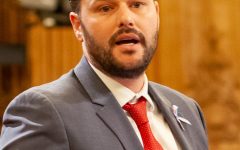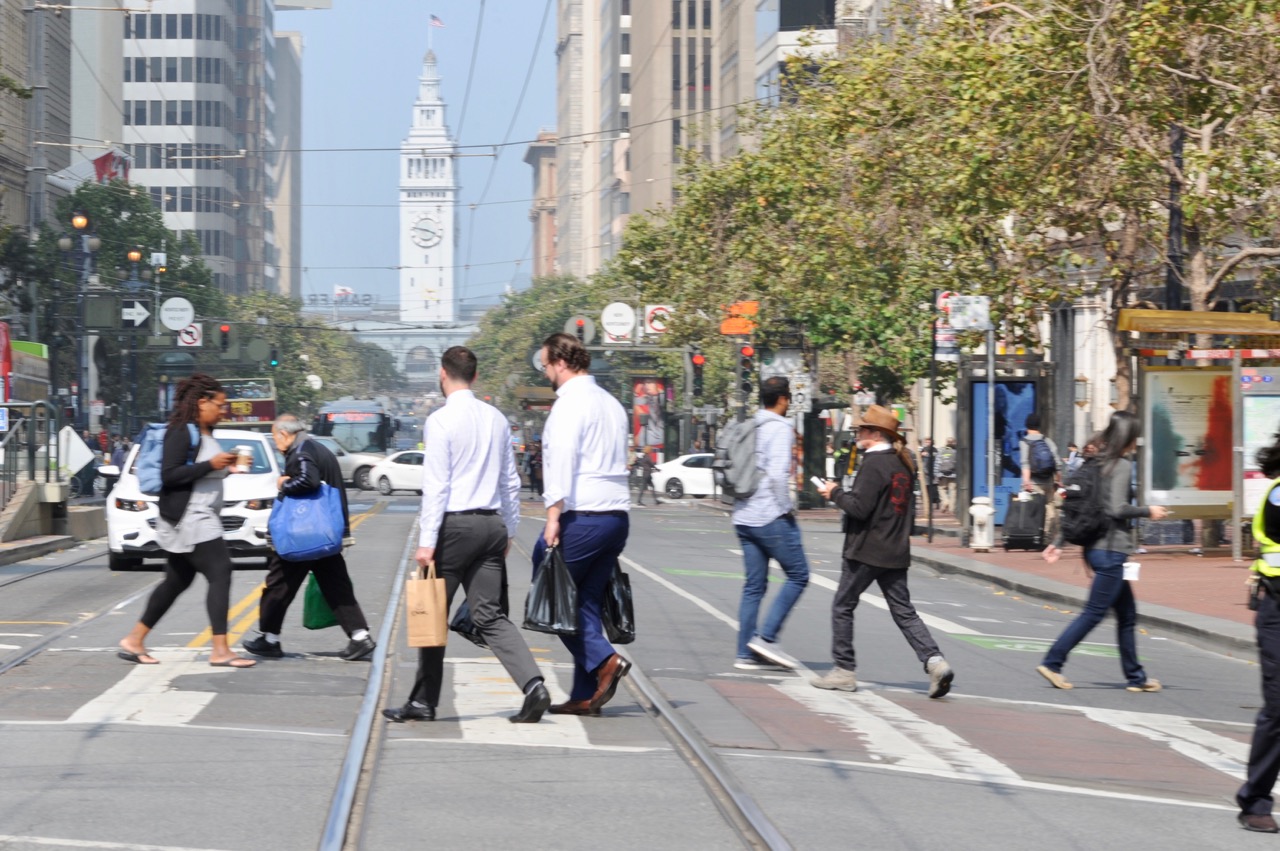
Skyline of Financial District at dusk, San Francisco, CA. (Photo: Jose Luis Stephens/ Shutterstock)
San Francisco Vacant Residential Unit Tax Ballot Measure Petition Kicked Off
If passed, ‘Empty Homes Tax would generate up to $38 million a year for city
By Evan Symon, February 9, 2022 2:29 am
In an announcement at San Francisco City Hall on Tuesday, SF City Supervisor Dean Preston announced a new petition to put a measure on the November ballot that would tax all vacant homes in the city.
Last month, San Francisco’s Budget and Legislative Analyst’s Office found that one in ten of the city’s homes and rental units are currently vacant. The report, which found that 40,458 homes and rental units had been left vacant for an extended period of time in 2019, shocked many in the city and across the state as California’s affordable housing crisis has gotten worse in recent years. The anger propelled Supervisor Preston to create the ballot petition in only a matter of days.

According to the petition, the proposed measure would begin in 2024 and would charge $2,500 for every residential unit under 1,000 square feet, $3,500 for empty units between 1,000 and 2,000 feet and $5,000 for all vacant residential units over 2,000 feet. The measure, also called the “Empty Homes Tax” would have the amount be increased over the next few years. In 2025, the taxed amounts would shoot up to $5,000, $7,000, and $10,000, while in 2026 the amounts would be $10,000, $14,000, and $20,000 respectively.
Preston made it clear on Tuesday that many would be exempt and that the tax is aimed at real estate speculators in the city. While size is the main component on how the tax is calculated, length of time it has remained vacant will also be a factor in how much is taxed. Even with exemptions, the tax is expected to bring in $38 million annually with the money going to homeless prevention and affordable housing endeavors, including rental subsidies for seniors and low-income residents.
“In a city with a chronic shortage of affordable housing, and more than 8,000 people living on our streets, it is unconscionable that we have tens of thousands of homes sitting empty,” said Preston in a press release on Tuesday. “The Empty Homes Tax will incentivize property owners to do the right thing and turn vacant units into places San Franciscans can call home.”
Preston, who based the vacancy tax on similar taxes in Vancouver, British Columbia and Oakland, which led to a 21% in vacant units in Vancouver and an extra $7 million a year in taxes in Oakland, added that he hoped to get the measure on the November ballot.
Announcing Empty Homes Tax with a few friends. Let’s do this! pic.twitter.com/JPT61TtxW0
— Dean Preston (@DeanPreston) February 8, 2022
However, real estate companies and some local residents remain skeptical that such a tax would work. In most cases, the fines don’t come anywhere near how much landlords would get back through rents and leases, with the option of keeping them open likely being more appealing then renting out for a lesser amount.
“A lot of landlords, and that includes everyone from a person buying a place for income from renters to corporate owners to real estate speculators, would rather pay that fine than lose money by renting the place out for cheaper to avoid the fine,” said Ellen Suzuki, a San Francisco landlord who has “at least 2” vacant properties in the city. “And that’s not even getting into getting tied up for a year with a cheaper lease then finding out that other were willing to pay more. So there’s a lot of holding out to either get your investment back quicker or going for the ones willing to pay more.”
“There’s a lot of money riding on buildings right now, but remember, that city report came out for the 2019 year. Things have changed a lot with COVID-19 here.”
Others noted that the tax would lead people to believe that new affordable housing projects simply wouldn’t be supported because of the belief that so many units were already vacant in the city.
“A vacancy tax makes no sense,” added Tenderloin Housing Clinic executive director Randy Shaw. “It creates this false sense that we don’t need to build more housing.”
The petition will need to get at least 9,000 valid signatures by July 11th from city residents to qualify for the ballot. If it gets enough, the measure will be left up to voters this November.
- San Diego Country Supervisor Jim Desmond Calls San Diego New Epicenter Of Illegal Crossings By Migrants - April 27, 2024
- Oracle Moving Headquarters Out Of Austin Only 4 Years After Moving Out Of California - April 26, 2024
- Congressman Adam Schiff Robbed of his Luggage in San Francisco Car Break In - April 26, 2024





Now the government wants to control what you do with your property? High taxes if you don’t do what they want. Their argument is 9000 homeless on the streets of SF? How much of these taxed dollars will go to house homeless? Taxpayers get hit again. Nobody wants to live in a city full of homeless, human feces, syringes, and crack pipes. Maybe if you cleaned up the city, prosecute criminals those empty rentals would be full. People are not interested in living in SF any longer. What I used to dream of what SF city life would be is no longer attainable or attractive.
Please stand and place your right hand over your heart. Begin: I pledge disloyalty to the democrats passed out on the streets in San Francisco; and to the feces and needles their junkies leave behind, one sanctuary city, under the DNC, without dignity or respect for all.
DEMOCRATS: “With voting machines and mail-in ballots, ANYTHING is possible! Yea, yea, yea!”
most of the houses that are not being rented are not going to be in the price range for the homeless.
How are they going to figure out what property is “empty?”
All of these schemes never work – perfect example is the low-moderate income properties. They never go back to check if the owner that qualified for the purchase at one point is worth millions of dollars 15 years later and now is out of state using it as a rental generating huge profits.
Here’s a thought, make the city livable again and perhaps some people will move back into their homes.
lead to a 21%….what?
“Preston, who based the vacancy tax on similar taxes in Vancouver, British Columbia and Oakland, which led to a 21% in vacant units in Vancouver and an extra $7 million a year in taxes in Oakland, added that he hoped to get the measure on the November ballot.”
It’s always the same proposal from the leftists… because of problem X, we will create a new tax Y. Here’s a better solution – let the people who are adversely affected by problem X get a job and solve their own problems (using the money they make from their own jobs). Just think, if everyone did their part (getting a job for men, getting married to an employed man if female), there’d be very little need for taxes or government.